
As artificial intelligence systems become more advanced and integrated into everyday life, their influence over human thought and behavior is growing—a development that carries significant ethical implications. While people have long been susceptible to influence from others with questionable intentions, being swayed by an entity that lacks human morals presents a new and complex challenge.
The growing presence of AI on platforms such as social media, recommendation algorithms, and automated chatbots means that decisions previously shaped by human interaction are now often guided by machine-driven logic. These technologies are designed to optimize engagement or performance, not necessarily to uphold ethical standards or emotional empathy.
This shift raises questions about how individuals can maintain autonomy and critical thinking in the face of increasingly persuasive AI tools. As machines become better at mimicking human behavior and language, distinguishing between genuine human guidance and algorithmic suggestion becomes more difficult—potentially altering public discourse, shaping opinions, and even influencing voting behavior.
Experts call for greater transparency, ethical governance, and public awareness to ensure that artificial intelligence serves as a tool for empowerment rather than manipulation. Recognizing the difference between influence from a morally questionable human and influence from an amoral system is essential in navigating the future of digital interaction and decision-making.
Source: https:// – Courtesy of the original publisher.








